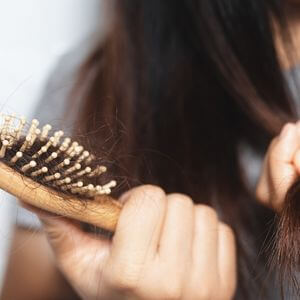Herbs for Hair Growth
 It’s tough when you age, get sick, or don’t know why you’re losing your hair and it starts falling out. I have experienced extreme hair loss myself and focused on natural remedies for hair growth, including herbs for hair growth, lifestyle, vitamins, and essential oils. It was a combination of these natural remedies that helped me experience hair growth.
It’s tough when you age, get sick, or don’t know why you’re losing your hair and it starts falling out. I have experienced extreme hair loss myself and focused on natural remedies for hair growth, including herbs for hair growth, lifestyle, vitamins, and essential oils. It was a combination of these natural remedies that helped me experience hair growth.
About Hair Growth
The cycle of hair growth varies from person to person, but it averages at around one-half an inch every month. Since nutrition and your personal beauty habits play a role in the rate at which your hair grows, there are some things you can do to promote hair growth. Simple dietary modifications and self-care practices can speed the seemingly tedious cycle of hair growth, although hereditary baldness might require the help of a dermatologist.
Food for Hair Growth
You have heard the phrase “you are what you eat.” We all know this does not mean that you might suddenly become a bacon cheeseburger. Instead, it means that your diet can directly affect your appearance and the way you feel. To promote hair growth, consume foods that nourish your skin, hair, and body. Certain foods will not only get your hair to grow faster, but will improve its texture and sheen as well. Protein-packed foods, such as eggs, lean meats, and leafy green vegetables, are some options. Fish is also an excellent source of essential fatty acids, and it has skin-nourishing properties. Try to eat fish twice weekly. Collagen may also be beneficial. It provides your hair with amino acids, which help build hair, and it helps with damaged hair follicles, and may even prevent hair thinning.
Lifestyle Habits
Stress, lack of exercise, and sleep can impact your overall health, including hair growth. Stress and a consistent lack of sleep rob your body of its ability to build and repair. A lack of exercise can impede circulation and lymphatic drainage, creating more stress on your body’s detoxification. Make sure to get enough sleep (7-8 hours), move your body daily, and manage your stress.
Vitamins for Hair Growth
Certain vitamins and supplements can also promote hair growth, particularly if you are deficient in iron or vitamin B-12. Iron deficiencies are fairly common, affecting approximately 12 percent of females ages 12 to 49 in the U.S., reports the CDC. A doctor can perform blood tests to determine whether your iron is low. It is also known that in post menopausal women, iron deficiency usually isn’t a concern for most women. Iron is hard to absorb in a supplement, so here are some food sources that are high in iron: beef, spinach, tofu, lentils, chicken, eggs, broccoli, liver, and green leafy vegetables. View more foods here.
I love
Herbs for Hair Growth
Horsetail and Gotu Kola contain silica, a trace mineral that exists in the hair. Silica helps strengthen hair and promote hair growth. Sage and rosemary are also beneficial for circulatory benefits as well as stimulating the hair follicles. I used NSP’s supplement HSN-W along with Collagen to support healthy hair growth, along with this scalp treatment recipe below.
Essential Oils
I created an essential oil scalp treatment using lavender essential oil, rosemary essential oil, and clary sage in jojoba oil. This combination was applied to my scalp and massaged in nightly to stimulate circulation to the area and promote healing and support for the hair follicles. The recipe is as follows:
- 1 oz jojoba oil in a glass dropper bottle
- 4 drops of Lavender essential oil (Lavandula angustifolia)
- 3 drops of Rosemary essential oil (Rosmarinus officinalis ct verbenone)
- 1 drop of Clary Sage (Salvia sclarea)
The above herbs and lifestyle changes, especially managing your stress, can help you improve the growth of your hair.
References: CDC: https://www.cdc.gov/nchs/fastats/anemia.htm
